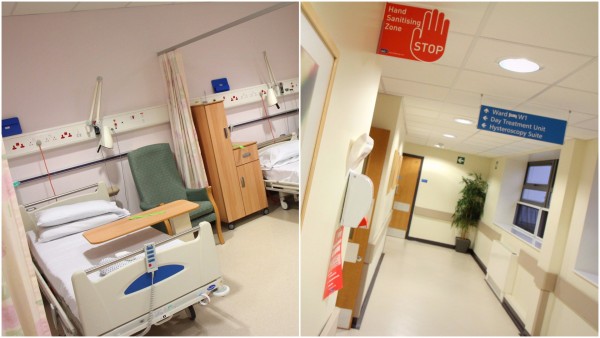
On this page
- Medication – if you normally take medication then please follow the instructions given to you at your pre-operative assessment appointment.
- Shower or bathe before coming to the hospital and remove make-up, nail varnish, gel or acrylic nails, jewellery or any piercings.
- If you have had diarrhoea or vomiting within 48 hours prior of your admission, please inform the Pre-admissions Department or call the ward directly. You should also inform us if you have had a cough, cold or flu symptoms during the immediate pre-operative period. On occasions it may be necessary to postpone your operation until you are well again.
- It is recommended that you do not smoke prior to your operation. By not smoking this helps to speed up the healing process, your overall recovery and reduces the risk of complications.
- It is very important that you follow the instructions given regarding eating and drinking on the day of your operation. If you don’t, this can complicate the anaesthetic process and could mean that your operation must be cancelled.
Interpreter Services
It is essential that good communication is always maintained during your visit. The Trust provides an electronic interpretating service should this be required.
What to bring in with you
Please bring a small bag packed with the items you will need on the day:
- Your admission letter and contact details for your GP and next of kin
- All medications including inhalers
- If you wear glasses, please make sure you bring them with you as this will enable you to see the relevant legal paperwork which needs to be signed before you can have your procedure / operation
- Any hearing or mobility aids you use
- A book or magazine to read whilst you wait
- Name and contact number of a relative or friend who will be collecting you after your operation
What not to bring
- Large amounts of cash, jewellery, or other valuables
- Alcohol
- Food
- Large bags or suitcases
On the day of your operation
Please report to the reception desk / nurses station on arrival at the Day Surgery Unit, Ward W1, which is located on Level 1 of the hospital.
A nurse will escort you to your allocated bed or trolley space and complete the admission process with you. A surgeon will discuss your operation with you and you will be asked to sign a consent form. If you are having an anaesthetic, you will also be seen by an anaesthetist prior to surgery.
Please note that as this is a day patient unit, we are unable to accommodate relatives or friends on the ward. However special circumstances will always be considered and accommodated if possible. There is a coffee shop on the ground floor of the hospital as well as vending machines selling drinks and snacks. Comfortable seating is provided in several areas for visitors to use whilst waiting. Relatives can either phone the ward, or you can contact them to let them know when you are ready to go home.
When it’s time for your procedure a nurse will escort you to the theatre. All patients admitted onto the ward are placed on a theatre list with the time of their operation. This is not an exact time and certain circumstances may lead to some delays in the time your surgery is performed.
After your operation
Following surgery you will be cared for in the post-operative recovery area of the operating theatre. Oxygen will be given via a mask or tube, as well as any pain relief or anti-sickness that might be required. A recovery nurse will check your vital signs regularly and take care of you until you are ready to be returned to the ward.
You will continue to be monitored on the ward and when you are feeling well enough you will be offered something to eat and drink.
Going home after day surgery
You should expect to be on the day surgery unit between 2 – 6 hours after your operation for your recovery. Not all patients react to anaesthetic in the same way and some patients may take more or less time than others to recover.
The ward team will continue to monitor your condition to decide when you are ready to go home. These checks will ensure:
- You are fully awake and have recovered from the anaesthetic
- You have passed urine
- You have had something to eat and drink
- Any pain is being managed at an acceptable level
- Any nausea or vomiting has been treated with medication
Once you have met all the above criteria you will be able to be discharged and the nurse will advise you to contact your relative, friend or partner to let them know you are ready to be collected.
Care at home
If you have had a general anaesthetic or sedation you will need to have a responsible adult to take you home and to be with you overnight and for up to 24 hours after your surgery. You will not be able to go home alone in a taxi or by public transport.
Failure to have this arrangement in place for your day case, this may result in your operation being cancelled.
Patient Transport Services (PTS)
The non-emergency PTS is available for eligible patients referred for treatment or procedures provided within a hospital setting. To find out if you are eligible for PTS and how to access it, you will need to discuss this with your GP beforehand so that they can book your transport in advance of your admission.